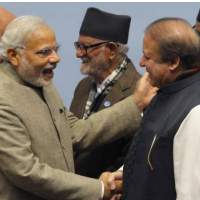Pakistan Fails in Bid to Stop SAARC Integration
 Modi shaking hands with Sharif (right) at the SAARC summit (photo: Reuters)
Modi shaking hands with Sharif (right) at the SAARC summit (photo: Reuters)
At the summit of the South Asian Association for Regional Cooperation (SAARC) in Kathmandu, a last-minute deal to create a regional electricity grid finally went through on Thursday. This will buttress Prime Minister Narendra Modi's ambition for an integrated South Asia to become a viable economic counterweight to China.
“The bonds will grow through SAARC or outside it, among us all or some of us. We can all choose our paths to our destinations. But, when we join our hands and walk in step, the path becomes easier, the journey quicker and the destination closer,” Modi told his counterparts on Wednesday.
The electricity agreement aims to create a regional energy market aimed at enhancing cross-border electricity trade between the countries in South Asia.
China’s ally Pakistan tried to stall attempts at integration during the summit, but a brief meeting between Modi and his Pakistani counterpart Nawaz Sharif on Thursday helped break the ice, according to Reuters.
Modi shook hands with Sharif at a mountain retreat outside Kathmandu and then again before the curtain went down on the conference. Yet except for these brief exchanges, the two leaders had spent most of the summit cold-shouldering each other.
Pakistan, which still refused to sign two other planned pacts to boost cross border road and rail traffic, was increasingly sidelined at the summit.
The divisions between South Asian countries is largely responsible for the poor performance of the SAARC grouping, initially founded with the goal of moving towards a European Union-style economic area.
Despite a free trade pact in force since 2006, high tariffs and tough visa rules limit trade among South Asian nations to just five percent of their total trade.
In his push for greater integration, Modi announced an easier regime for business and medical visas and promised to lower India's trade surplus. He also made it clear that if integration was not possible at the SAARC level due to Pakistani intransigence, India would achieve this though bilateral deals with its South Asian neighbours.
According to Reuters, SAARC’s failure to foster closer ties over the past three decades has left the way open for China to make inroads in the region, by helping to build ports and roads.
China has observer status at the summit. Vice Foreign Minister Liu Zhenmin on Wednesday promised $30 billion for road building in South Asia over five years, and suggested increasing trade to $150 billion over the same period.
- Karan Singh
To Learn More:
SAARC summit salvaged after handshake by leaders of India, Pakistan (by Gopal Sharma and Frank Jack Daniel, Reuters)
After chill, the thaw: handshake, but no talks (by Shubhajit Roy and Yubaraj Ghimire, Indian Express)
SAARC leaders to push Pakistan PM Nawaz Sharif to sign 3 key pacts (by Shubhajit Roy and Yubaraj Ghimire, Indian Express)
- Top Stories
- Controversies
- Where is the Money Going?
- India and the World
- Appointments and Resignations
- Unusual News
- Latest News
- India College Chain’s Expansion into U.S. Draws Opposition from Massachusetts Officials over Quality of Education
- Milk Shortages in India Tied to Release of New Movies Featuring Nation’s Favorite Stars
- Confusion Swirls around Kashmir Newspaper Ban in Wake of Violent Street Protests
- Polio-Free for 5 Years, India Launches Vaccine Drive after Polio Strain Discovery
- New Aviation Policy Could Increase Service, Lower Ticket Prices






Comments